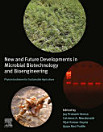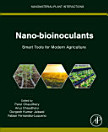Microbial Engineering: A Sustainable Approach for Remediation of Emerging Soil Pollutants
About this ebook
About the author
Dr. Durgesh Kumar Jaiswal is an esteemed academic and researcher in the biotechnology field, currently serving as an Assistant Professor in the Department of Biotechnology at Graphic Era (Deemed to be University) in Dehradun, India. Dr. Jaiswal earned his Ph.D. in Biotechnology from the Institute of Environment & Sustainable Development at Banaras Hindu University in 2019. He completed his Dr. D.S. Kothari postdoctoral research at Savitribai Phule Pune University in 2023. His research interests lie primarily in agro-microbial biotechnology and sustainable agriculture, where he aims to develop microbial consortia for plant probiotics, crop improvement, pesticide degradation, abiotic and biotic stress management, and ecological assessment of biotoxicity of agro-chemical hazards towards soil microbiomes and food crops Throughout his career, Dr. Jaiswal has received numerous accolades, including the American Society for Microbiology (ASM)-Future Leaders Mentorship Fellowship for 2024-2026 and recognition as a Global Ambassador for India by Applied Microbiology International for 2024-2025. He has also been awarded the prestigious Dr. D.S. Kothari Postdoctoral Fellowship by the University Grants Commission in New Delhi. His research contributions have been recognized with awards such as the NASI-Swarna Jayanti Puraskar in Biological Science, highlighting his impactful work in the field. Dr. Jaiswal's extensive publication record with over 58 research articles, reflecting an H-index of 21, underscores his significant influence in biotechnology and agro-environmental sustainability. He actively participates in academic service as an associate editor for Frontiers in Microbiology. He serves on editorial boards for several journals, including BMC Plant Biology, BMC Microbiology, Scientific Report, and PLOS One. His teaching portfolio includes advanced courses in molecular biology, microbiology, biofertilizers, and sustainable agriculture across various academic levels, demonstrating his commitment to education and mentorship. Furthermore, he has supervised numerous dissertations at both doctoral and postgraduate levels, fostering the next generation of scientists in biotechnology. Through his research, teaching, and mentorship efforts, Dr. Jaiswal continues to contribute significantly to advancements in sustainable agricultural practices and environmental conservation.
Dr. Jay Prakash Verma competed his B.Sc., M.Sc. and Ph.D. on plant-microbe interaction and PGPR. He works as a Senior Assistant Professor in IESD, Banaras Hindu University, India, where he started in February 2011. He has more than 11 years of research expertise on rhizosphere microbes and development of effective plant growth promoting microbial consortium as biofertilizer, bio stimulators for multiple crop production under control, and field conditions. His research expertise encompasses biofertilizer, phytomicobiome, bio-pesticide, PGPR, PGPF, sustainable agriculture, plant-soil-microbe interaction, soil fertility and soil health management, pesticide degrading microbes for bioremediation, soil molecular biology and climate resilient agricultural production, and bioethanol production. He has written more than 60 articles that have been cited more than 1831 times and has a cumulative impact factor of over 100. He has more than eight research projects related to plant-microbe interactions. He has been a speark at international conferences in Spain, France, and China. He is serving as Technical Editor for several international journals including Biotechnology, Journal of Applied Sciences, International Journal of Soil Science, Asian Journal of Biological Sciences, and Bacteriology Journal. He is a member of the editorial board for the journals Agriculture for Sustainable Development published by Social and Farmers Welfare Society, Journal of Environmental and Social Sciences, International Journal of Research Studies in Microbiology and Biotechnology, International Journal of Research Studies in Agricultural Sciences, International Journal of Research in Environmental Science, and Microbial Biosystems Journal published by The Arab Society for Fungal Conservation. He acts as a reviewer for various peer-reviewed national and international journals of publishers including Nature Publishing Group, Elsevier, Springer, Willy, and Taylor and Francis. He is also a project evaluator for of The Czech Academy of Sciences, Science Support Division in Czech Republic, European Commission. He is presently a visiting fellow at the Hawkesbury Institute for the Environment, Western Sydney University, Sydney, Australia.




